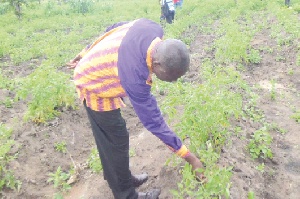Regional News of Thursday, 11 December 2014
Source: GNA
Farmers in Bolgatanga to get support for dry season farming
The Climate Change Adaptation in Northern Ghana Enhanced (CHANGE Project) implemented by Trade Aid Integrated, a Bolgatanga based non-governmental organization on Tuesday urged its beneficiary farmers to go into dry season farming as it had funds to support them.
Mr Nicholas Apokera, Executive Director of Trade Aid, said 231 farmers were supported under the CHANGE Project with GH¢62,630.00 from the Naara Rural Bank in Bolgatanga but not all the fund was exhausted so they could still make good use of it during this dry season.
He said this at a forum that brought together beneficiary farmers of CHANGE Project, Agricultural Extension staff, input suppliers, financial institutions, staff of the Meteorological Services Department and National Disaster Management Organization to share ideas on the project and ways to improve on future interventions.
The Change Project, which started in 2013, has the objective to improve upon adaptive capacity and increase the resilience of small holder farmers on the impacts of climate change in the Bolgatanga Municipality.
The project supported 3,500 men and women farmers in seven communities namely Nyariga, Yikene,Vea, Goore, Sumbrungu, Zaare and Yorogo.
He said 70 households were supported in 10 communities with energy saving stoves whilst 84 storage facilities were distributed to other communities within the last two years.
Mr Simon Amoah, Coordinator of the CHANGE PROJECT, said other activities carried out during the project period included supporting farmers with climate smart agricultural strategies to improve production.
He said farmers were trained on identification of contours, compost making and agro forestry. They were also linked to MOFA for improved and early maturing seeds for planting and input suppliers for fertilizers among others.
Mr Amoah said each of the seven communities was supported with three hectares of vertiver grass farms that they harvested to weave their baskets, thereby reducing annual travel of farmers to the south to buy the materials.
He said the project had contributed to bringing change in livelihoods of the farmers and their families.
Farmers said late delivery of inputs, poor performance of rice cultivated during the last rainy season due to inappropriate fertilizer supplied them retarded the growth of their rice crop.
They also recommended improved tractor services as operators of tractors that came round to plough their farms were inconsistent with measurement of farmlands leading to overcharging.











